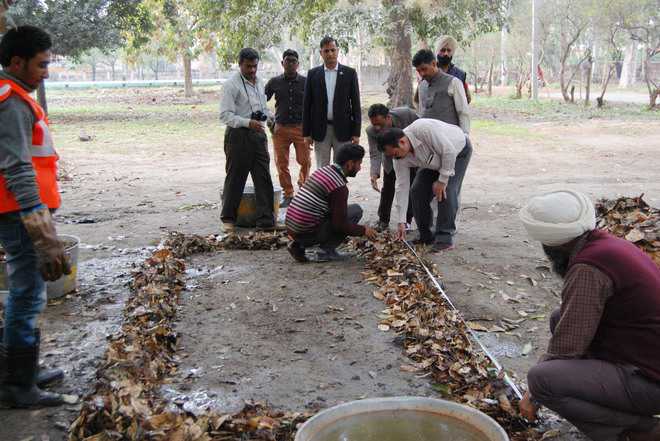Tribune News Service
Amritsar, March 14
The staff and workers of the Municipal Corporation got tips on managing garden and dry leaves at a session in Company Bagh here today. Director of Indian Green Services, C Srinivasan, was the resource person on the occasion.
Scientific method for waste management
Srinivasan explained the scientific methods of treating dry and wet garden waste that could also reap income. He said, “Like the solid liquid resource management (SLRM) model, this too works on applying scientific procedures into garbage disposal. Mulching is one of the techniques applied to reduce space and treat garden resources without much effort. A composting bed which can hold seven tractor load of dry leaves can be created.”
“The mulch harvest date for the training performed today is mid of May. The MC can get a minimum of Rs 18,000 from the three tonnes of mulch produced. Meanwhile, it improves soil fertility and retain moisture of the soil,” he added.
Srinivasan will be returning to city for a series of workshops and training on the invitation of Amritsar Municipal Corporation. He believes that the concept could generate local green jobs while also producing resources from waste management for the local market. His two day workshop in city ended in tie-ups with schools and institutions for creating awareness regarding scientific methods of solid-liquid waste management.
A source for generating revenue for civic body
Srinivasan has been turning garbage into gold with his concept of solid and liquid resource management. He was in Amritsar to study and sensitize people about his concept. He say, “Waste (or the so-called waste, according to him) is an important resource and can be used to generate income and green jobs for BPL families.”
Sharing his vision for the green cities and his popular Vellore model of waste management, Srinivasan said the Amritsar Municipal Corporation could recover 3.6 lakh per month from its waste, if the concept was implemented.
Individuals can manage garbage themselves
He said, “Basically, my concept works on an individual basis, where people have to manage their own waste. It works on the principle of a decentralised process of disposing of garbage wherein waste generated in different categories by individuals can be separated through various methods. So, you do not need a landfill site.”
Srinivasan popularized the concept after appearing on Satyamev Jayate. He said, “Amritsar produces 158 categories of garbage that can be reused, including plastic metal and rubber products, besides 20 types of plastic bottles that can be sold in the local waste market and turned into a profitable venture.” “Fifty four categories of urban waste like eggshells, coconut fibre and other products can be reused, and only 15 categories of garbage come under the non-compostable category. That too can be bailed out to reduce volume and treated for disposal,” he added.
Can create green jobs
Addressing a gathering of officials, NGO members, citizens and students here yesterday, Srinivasan said this model had already been adopted by several cities and villages as a community self-help effort to generate resources and give green jobs for local BPL families.
He said, “The project is being run under self-help group federations, which train work force. The minimum recovery from SLRM is Rs 3 per day. Only, one needs to implement and adopt the concept individually.”
Srinivasan will now work in association with the MC to conduct training workshops for the workforce in city. He said, “We will work with the MC and a tentative time period fixed for the project to implement has been set as October 2017. The SLRM gives results within 18 months of the implementation.”
SLRM is solution to Bhagtanwala
Saneep Kurl, a representative of the Bhagtanwala Sangharsh Committee, who attended the workshop, considers the SLRM project to be the only possible solution for Bhagtanwala dump row. He said, “The project propagates that we manage our waste scientifically and require no landfill site. It has proved effective in many cities including Vellore, Mysore and in Rajasthan. I think we are looking for a solution to our garbage woes with this concept.”
Indu Aurora, from Voice of Amritsar, said the concept could be used as an educative and awareness tool to sensitize people and connect families to generate income from the waste materials.
Unlock Exclusive Insights with The Tribune Premium
Take your experience further with Premium access.
Thought-provoking Opinions, Expert Analysis, In-depth Insights and other Member Only Benefits
Already a Member? Sign In Now










